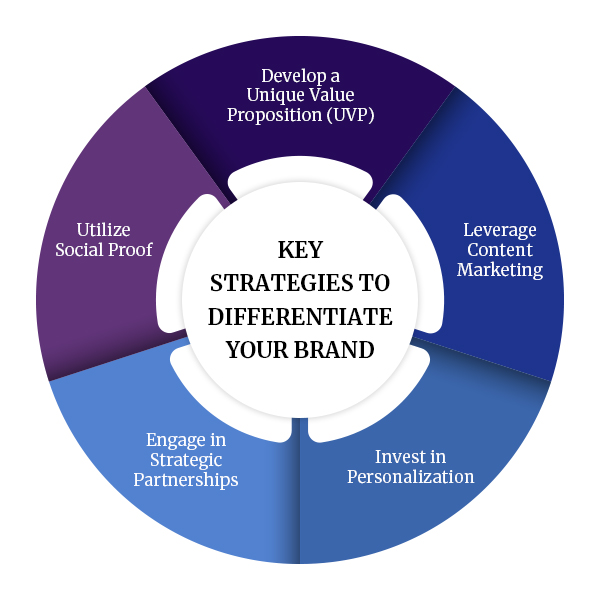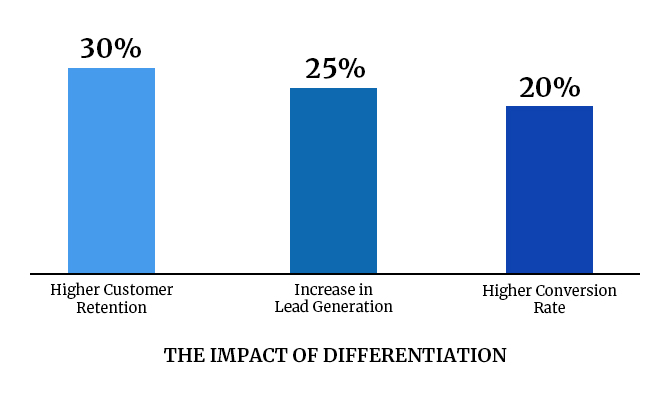Table of Contents
In a crowded B2B marketplace, making your brand stand out is crucial for attracting and retaining clients. But how do you differentiate your brand in a world where every company seems to offer similar solutions? In this guide, we’ll explore strategies to elevate your brand, backed by real market data and a compelling case study.
The B2B Landscape: Why Standing Out Matters

In B2B markets, businesses are not only competing with direct competitors but also vying for the attention of potential clients who are inundated with choices. According to a 2024 report by HubSpot, 67% of B2B buyers say they will only engage with a company if they perceive it as a leader in its field. Standing out is not just about visibility; it’s about establishing credibility and trust.
Key Strategies to Differentiate Your Brand

- Develop a Unique Value Proposition (UVP): Your UVP should clearly articulate what makes your product or service unique. It’s not just about what you offer but how it solves your client’s problems in a way that no one else does.
- Leverage Content Marketing: Create valuable, insightful content that addresses the pain points of your target audience. This positions your brand as a thought leader and builds trust with potential clients. According to Content Marketing Institute, 81% of B2B marketers say their content marketing strategy has increased their brand visibility.
- Invest in Personalization: Tailor your marketing efforts to address the specific needs and interests of different segments of your audience. Personalized experiences can increase engagement rates by up to 20%, according to Salesforce.
- Utilize Social Proof: Showcase testimonials, case studies, and reviews from satisfied clients. Social proof can significantly influence buying decisions. A study by Nielsen found that 92% of consumers trust recommendations from people they know, and 70% trust online reviews and opinions from strangers.
- Engage in Strategic Partnerships: Collaborate with other businesses or influencers in your industry to expand your reach and enhance your credibility. Partnerships can open new channels for visibility and provide access to a wider audience.
Real Market Data: The Impact of Differentiation

A 2024 study by Gartner revealed that companies with a strong, differentiated brand experience a 30% higher customer retention rate and a 25% increase in lead generation compared to those without a clear brand distinction. Additionally, brands that effectively communicate their UVP see a 20% higher conversion rate.
Case Study: HubSpot
HubSpot, a leader in inbound marketing and sales software, provides a great example of how to stand out in a competitive B2B world.
Background: HubSpot faced intense competition from other marketing software providers. To differentiate itself, HubSpot focused on building a strong brand through content marketing, personalization, and thought leadership.
Differentiation Strategy
- Unique Value Proposition: HubSpot’s UVP centered around its comprehensive inbound marketing approach, integrating marketing, sales, and customer service tools into one platform.
- Content Marketing: HubSpot developed a vast library of educational content, including blogs, eBooks, webinars, and courses. This content not only provided value to their audience but also established HubSpot as a thought leader in the industry.
- Personalization: HubSpot used data-driven insights to deliver personalized content and recommendations to its users.
- Social Proof: The company featured case studies and testimonials from successful clients across various industries.
- Strategic Partnerships: HubSpot formed partnerships with other tech companies and industry influencers to expand its reach and enhance its credibility.
Results: HubSpot saw a significant increase in brand visibility and lead generation. Their content marketing efforts helped drive a 30% increase in website traffic and contributed to a 25% rise in qualified leads. The company also experienced a 40% improvement in customer retention rates.
Conclusion

In the competitive B2B world, standing out is essential for attracting and retaining clients. By developing a unique value proposition, leveraging content marketing, investing in personalization, utilizing social proof, and engaging in strategic partnerships, you can differentiate your brand and drive growth.
Ready to elevate your brand? Dive deeper into strategies for standing out and discover more insights by tuning into GrowthBuzz. At GrowthBuzz, we’re more than just an e-magazine; we’re a dynamic hub for entrepreneurs, innovators, and thought leaders looking to make a mark in marketing, business, technology, sales, and administration. Visit GrowthBuzz to access the latest episodes, articles, and industry trends.
Want to share your expertise or insights on branding? We invite you to contribute to GrowthBuzz! Your experiences and knowledge can inspire and inform our global audience of entrepreneurs and innovators. Reach out to us via our website to learn how you can get involved.









